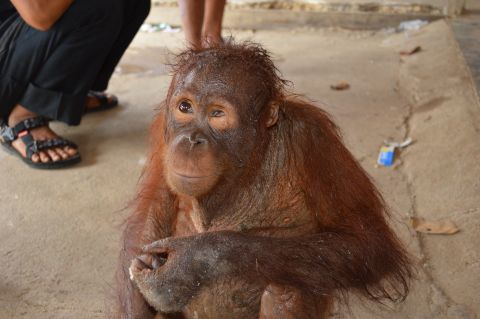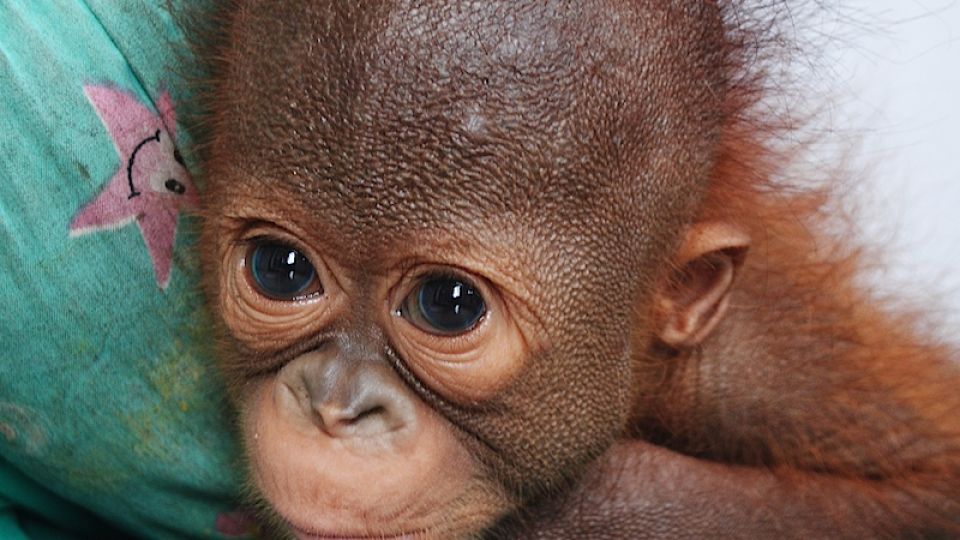
Following a series of rescue operations carried out by the local police, forestry department and members of IAR’s team in Ketapang in which six orangutans were confiscated, the District Chief Commissioner of Police, Mr Agus Setyoko, has voiced his deep concern about the illegal trade in orangutans and expressed a determination to combat it.
Witnessing the arrival of two infant orangutans at IAR’s Orangutan Conservation Centre in Ketapang, Mr Setyoko said: “It is everyone’s responsibility to assist in the conservation of protected wildlife, not by keeping them as pets but by ensuring that they can live freely in their natural habitat.”
The Head of the Forestry Police (BKSDA) in Ketapang, Mr Junaedi, said: “All six orangutans rescued during October were being kept illegally. The number of rescued orangutans in Ketapang is increasing. It is time for people to take action to protect wildlife and their habitat.”
The six newly arrived orangutans join 76 orangutans currently undergoing rehabilitation at IAR’s Orangutan Centre. It will take many years to teach the youngsters the forest skills that they would usually learn from their mothers. The end goal is always to release them back into the wild.
“There has been a noticeable increase in the number of calls for help received at our Orangutan Centre,” said Dr Karmele Llano Sanchez, Project Director of IAR Indonesia. “We operate the only rescue and rehabilitation centre for orangutans in West Kalimantan and so, if we don’t step in and help these desperate animals, no one will.”
The Bornean Orangutan population has experienced a 50% decline over the last 60 years. This sharp drop in numbers has predominantly occurred during the past few decades and can be attributed to: habitat loss owing to the conversion of forested areas to agricultural plantations such as oil palm; habitat encroachment from large scale industries such as mining; and illegal hunting and the illegal trade in orangutans as pets.
Intensifying the problem, this year has seen an El Niño weather system affecting the region. This has brought extreme heat and drought and turned the parched landscape into a tinderbox. Fires have raged over vast areas of West Kalimantan for weeks, destroying everything in their path and engulfing the area in a blanket of smoke. Research from the World Resources Institute shows that over half the fires are on land owned by logging, oil palm and pulpwood plantations, suggesting that some companies are still using illegal ‘slash and burn’ farming as a cheap method to clear large swatches of land. The extra pressure of these fires on the already fragmented orangutan habitat results in an even higher number of displaced animals, thus increasing the risk of orangutans coming into conflict with humans who may perceive them as pests. This often results in adult orangutans being killed and their infants being taken and kept as pets or sold into the pet trade.
Orangutans are protected under Indonesian law. Keeping an orangutan as a pet is illegal - hence the recent clamp down by the Natural Resources Conservation Agency (BKSDA) in collaboration with the District Police (PolRes), assisted by International Animal Rescue (IAR) and local group Yayasan Palung to remove the six young orangutans from residential properties in and around Ketapang.

Among the team’s most recent rescues was Jemmi, a baby orangutan of no more than six months old who should have been in the care of his mother in the wild for the next six to seven years. Instead, the tiny infant was found tied up in a cardboard box in a house in the area of Pesaguan. By the time he was brought to the IAR Orangutan Centre he was seriously dehydrated and his leg was swollen where he had been tied up. Karmele explained: “Only a few months ago Jemmi’s mother gave birth in the forest, but not long afterwards she was almost certainly killed and her baby was taken as a pet. Fortunately for Jemmi, the BKSDA in Ketapang was notified of his existence and contacted us to help with his rescue. He is one of the lucky ones.”
Mr Fransiskus Edy, the owner of another rescued orangutan named Dio from the Marau subdistrict in Ketapang, alleged that he bought the orangutan for 500,000 Indonesian Rupiahs (US$ 50.00). He said: “I met a few hunters who had just killed Dio’s mother and they were going to eat the orangutan and her baby. I then decided to buy this baby orangutan and not let the hunters kill him.” Dio is approximately 2½ years old, he had been kept illegally for around two years. He was chained up to a pole at the front of Mr Fransiskus’s workshop next to a busy road. Dio is missing one eye, as the owner explained: “He lost his eye when the hunters killed his mother.” IAR’s veterinary team have confirmed that bullets have been found in Dio’s body and that he has indeed been shot in the eye. Mr Fransiskus declared that previously he had kept another orangutan as a pet: “I know they are protected but I like to keep orangutans as pets as my children like to play with them,” he said.
“With these two new rescued orangutans,” says Dr Adi Irawan, Operations Manager of the IAR Orangutan Rescue and Conservation Centre “the total number of animals we have rescued in the last five years is 110. We are working hard to rehabilitate them so that they can be returned to the wild but it is a lengthy process lasting many years before they are skilled enough for a life in the forest. In the meantime, the numbers in rescue centres like ours are rising. It’s a very bleak picture indeed.”
As well as rescuing orangutans, the BKSDA and IAR also run a Human-Orangutan Conflict mitigation unit. The aim of this unit is to work with local communities on socialisation, education and awareness activities so that they understand the issues that the orangutans face. By replacing the natural feeling of fear with knowledge about what to do if people encounter an orangutan, the conflict situation can be avoided. Usually, the BKSDA and IAR’s expert team can relocate the orangutan to a safe area of forest.

